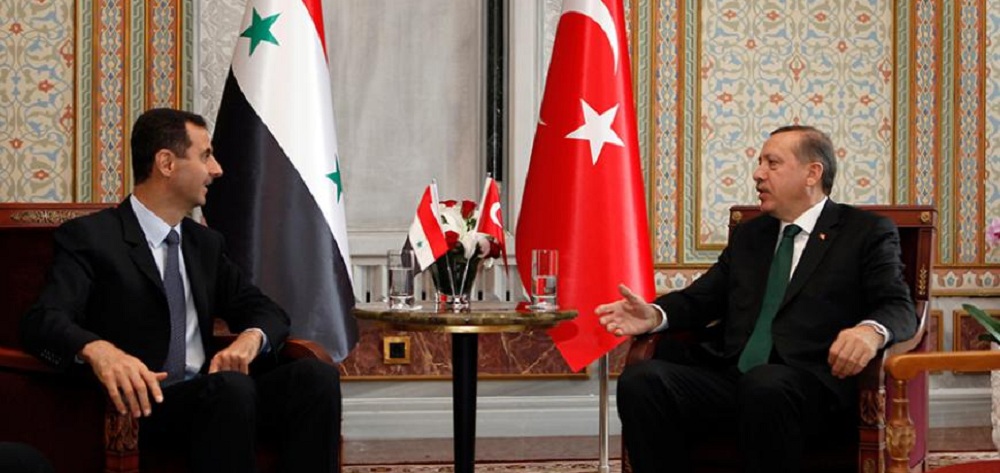Alwaght- Amid rising rumors about a change in the Syrian-Turkish relations that have been tense over the last decade, preliminary moves are being made by the two sides to develop a framework to transition from the current status.
With a decade of full-scale Turkish hostility and existence of an array of ultimately conflicting issues and interests, taking conservative but firm initial steps by the two countries is a natural and realistic behavior and settling the complications without a cohesive plan cannot be expected.
In recent days, officials and political figures from both sides in informal positions and on the media have mentioned their numerous conditions to negotiate. Their conditions indicate the seriousness for starting negotiations in the near future and a promise of a complete end to the Syrian crisis and the return of stability.
Despite Damascus's general well-reception of Ankara's show of will to walk away from its past hostile approach, the Syrian setting of conditions for a rapprochement indicated that they want the negotiations to produce a sustainable deal with the Turks to save their national interests and they indeed reject talks that produce no peaceful end to the crisis.
Syria stipulated restoration of full control over Idlib as the last stronghold of Turkish-backed terrorists. Also it demanded control over Bab Al-Hawa border crossing, the customs of Kasab border crossing, and a trade route known as M4 that links Deir ez-Zor to Hasakah and Aleppo to the port city of Latakia.
The Syrian government also demands Turkey's support for the lifting of European and American sanctions against individuals and companies related to the Syrian government.
Given the fact that the Syrian government managed to contain the critical situation of the country by spending a lot of money and over a long period of time and beating the terrorists and their regional and international supporters on the battlegrounds, it is realistic and logical to talk to Turkey from a high position. The reason why Syria did not set the same conditions in detente with such Arab countries as UAE is that Turkey has a different position in Syrian crisis and occupational presence in a hefty chunk of northern Syria and from now their status under any title including safe zone keepers and also the status of Ankara-sponsored terrorists in Idlib should be made clear.
The emphasis on economic and security cooperation and Turkey's support for Western sanctions relief is a favorable sign from Damascus to start a new era of relations between the two countries based on cooperation, peace, progress and understanding of mutual security needs.
On the other hand, revealing the Turkish conditions, Türkiye Gazetesi newspaper pointed to the readiness of a delegation of leaders of Erdogan-aligned Patriotic Party to visit Damascus and prepare the ground for normalization negotiations. Turkey demands the complete cleansing of the areas under the control of the Democratic Union Party (PYD), the Syrian branch of the Kurdistan Workers' Party (PKK), the complete elimination of terrorist threats on its borders, the completion of a political and military process between the opposition and Damascus, and safe return and resettlement of Syrian refugees in their country.
According to the Turkish newspaper, Ankara demands Homs, Aleppo, and Damascus to be the test areas for safe refugee rerun in the first stage and then other areas host refugees. Other demands include continuing of Geneva peace process, writing a democratic new constitution, and holding free elections, the newspaper added.
Turkey's conditions come in a situation when Ankara by promoting its will for negotiations practically admits failure of its past policy for toppling the Syrian president through supporting and arming a litany of terrorist groups. In fact, Erdogan has come to the belief that the remaining armed groups in Syria, who are mainly concentrated in Idlib, are not capable of overthrowing President Bashar al-Assad government or even pressing for constitutional changes. Additionally, they have lost their military standing as a result of the powerful blows dealt to them by the Syrian army and its allies. Therefore, the field developments have gone without any achievements for Turkey.
But Turkish conditions like holding free elections which reflect that Ankara is not recognizing last year's presidential election that was held with a high turnout rate or other interferences in sovereignty issues like Syrian government's relations with the Kurds is neither realistic nor acceptable and are a repeat of the failed past policies. The interpretation of these conditions is that Turkey tries to save Erdogan's face internally and assure Ankara-backed terrorists who, concerned about Erdogan's betrayal of them, strongly opposed the Turkish tendency for talks with Damascus in recent days.



























